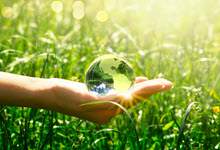Sustainability Initiatives

As part of the City’s Strategic Plan Our City, Our Future is the goal to be a Sustainable City – a city that is sustainable today and for future generations; economically, environmentally and financially.
The City of St. John's has implemented numerous services and programs to protect our natural environment and to ensure wise use of resources.
Today, to recognize Earth Day we are highlighting some of these sustainability initiatives. An Earth Day flag raising is taking place at 2 p.m. outside City Hall, led by Deputy Mayor Sheilagh O'Leary.
Community Climate Plan
In March 2021 the findings of the first round of public engagement to guide a community climate change plan were accepted by City Council.
The purpose of the engagement was to help identify how climate change impacts St. John’s as a community, what is important to residents and suggestions related to reducing or mitigating greenhouse gas emissions (GHGs).
The Resilient St. John’s Community Climate Plan is expected to be released in late summer 2021 and will identify a 30-year strategy to reduce GHGs across our community while maintaining equity at the forefront. It will also provide strategies to further prepare the City to address challenges and opportunities presented by climate change.
Learn more at EngageStJohns.ca.
Active Transportation
How we move around our community affects our environment. The City is strategically developing and investing in active transportation pathways to create a network of shared paths that allow residents to enjoy active modes of transportation including walking, running, biking and rolling.
The Kelly's Brook Shared-Use Path is a great example of this. The City and partners are investing funding to create a 4.8 km recreation corridor and active transportation route from the east end near Quidi Vidi Lake to the west end at the intersection of Prince Philip Drive and Empire Avenue, while connecting popular destinations and amenities along the way.
Learn more about this project at EngageStJohns.ca.
Four Bag Limit, Clear Bags and Curbside Recycling
The new Sanitation Regulations introduced in January 2021 specifies a maximum four-bag limit for weekly garbage collection at the curb. This encourages residents to only put non-recyclable waste in garbage bags in order to stay within the four-bag maximum, and to put recyclables in blue bags.
Beginning in January 2022 the City will require the use of clear garbage bags (see-through, colourless) with one black or non-transparent privacy bag per collection. Recyclables are not allowed in the clear garbage bags at the curb, further encouraging curbside recycling.
Keep useable items out of the landfill and recycle all that you can. Why throw something away that can be recycled instead? Recycling is the right choice; learn more at CurbItStJohns.ca.
Backyard Composting
The City of St. John's, in partnership with the MUN Botanical Garden and the MMSB, have offered free backyard compost sessions and subsidized bins for about a dozen years.
During COVID-19 restrictions, the free sessions have moved online – thanks to the composting experts at the MUN Botanical Garden.
Watch the short-video segment sessions at a time that is convenient for you. Once the Composting Made Easy! tutorial is complete, forward a copy of the certificate to curbit@stjohns.ca for details on how to purchase a subsidized backyard compost bin.
Tree Planting
Each year 400 to 500 trees are planted in the city to diversify the urban forest so that it is more sustainable and less prone to disease or infestation. Our annual tree planting program provides a balance between native and hardy non-native species suited to our local climate.
In recent years the City has provided homeowners in residential areas lacking trees with a voucher towards the cost of a new tree, planted so that it is viewable to the public, to fill some gaps in our urban forest. In 2016 and 2019 hundreds of trees were planted on homeowner properties throughout the city.
Water Conservation
Every bit of water we drink must be treated, and that costs money. We are all responsible to use water efficiently for our own health and well-being, the environment and for wise use of City finances and resources.
Since 2002 a Water Conservation Order has been in place to ensure wise water use, especially during the summer when outdoor water consumption increases.
When to water your lawn with a sprinkler:
- Even house number: Tuesday and Saturday, 6-8 a.m. and 8-10 p.m.
- Odd house number: Thursday and Sunday, 6-8 a.m. and 8-10 p.m.
The City has a leak detection program to find leaks in watermains and fire hydrants and can also locate leaks in residential water service pipes. As well as posing a risk of flooding or property damage, leaking water is a waste of treated, drinkable water. Each year staff check 622 km of watermains and 3,432 fire hydrants for leaks and in 2020 discovered more than 367 leaks in the system.
